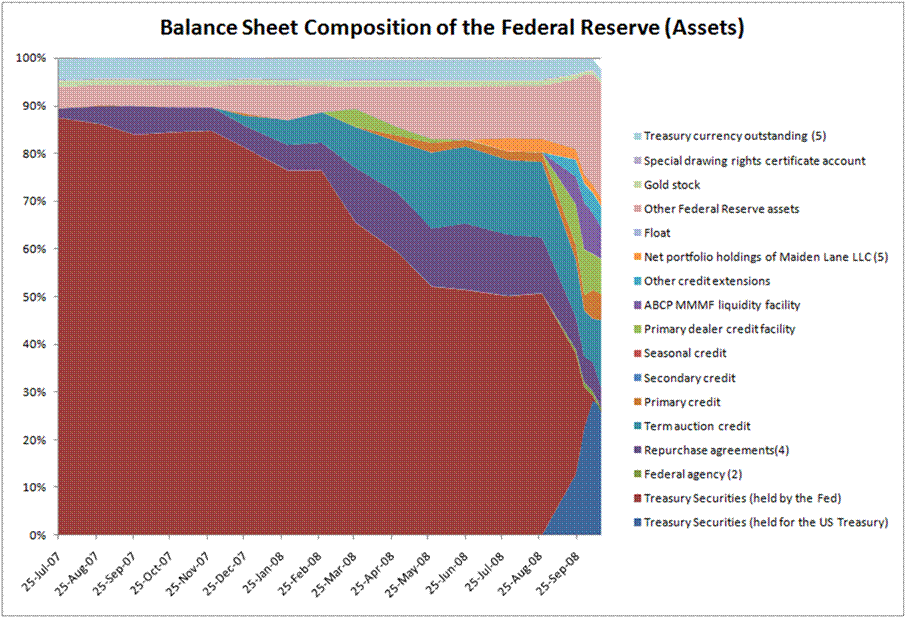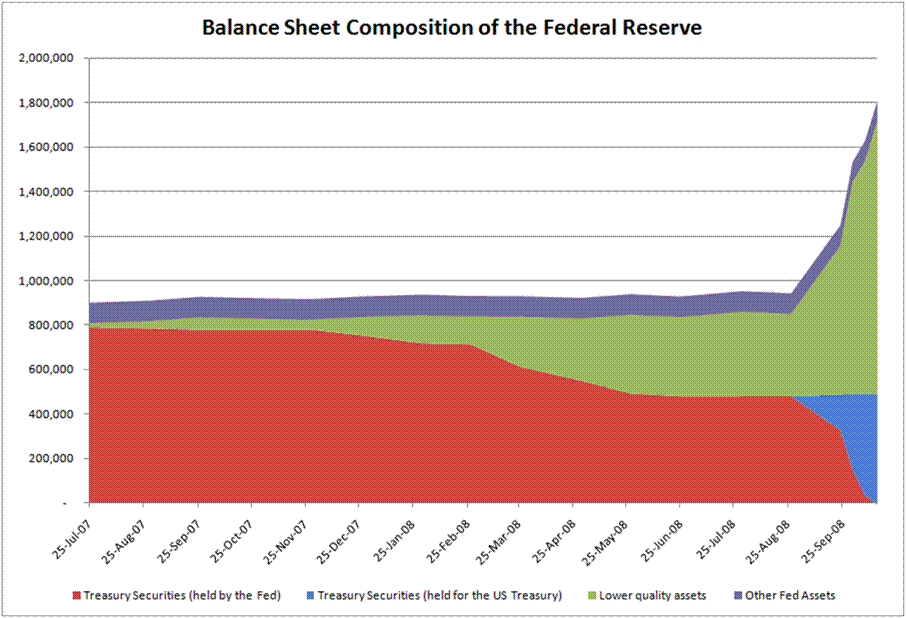Eight Notes and Comments on the Current Crisis
1) Greenspan — what a waste.? A bright, engaging man becomes a slave to the Washington political establishment.? Now he gives us a lame apology, when he should be apologizing for his conduct of monetary policy, which encouraged parties to take on debt because of the Greenspan Put.? Now the debts are too big to be rescued by the Bernanke/Paulson Put, where the Government finances dodgy debts.
On a related note, Gretchen Morgenstern is right when she calls the apologies hypocritical.? I would only add that Congress also needs to apologize; they did not do oversight of the Administration properly.? Many members of the oversight committees are not economically literate enough to do their jobs; they can only score political points.
2) I found this post highly gratifying, because it points out the disconnect between macroeconomics and finance, which I have been writing about for years.? When I was an economics grad student, I felt economics had gone astray by trying to apply statistics/mathematics to areas that could not be precisely measured.? In this case, if your models of macroeconomics can’t accommodate the boom/bust cycle, you don’t deserve to be an economist.
3) You want accounting reform?? Start with accounting that disallows gains-on-sale in a financial context.? WIth modern life insurance products, gain from sale is not allowed under SFAS 97, and I would modify SFAS 60 to be the same way.? No profits at sale.? Profits are earned in a level way over the life of the business as risk decreases.? Let other financial firms use something akin to SFAS 97, and many business problems would be solved.
4) What freaks me out about this article is that Taiwan is refusing the full faith and credit of the US Government, which stands behind GNMA securities.? Don’t bite the hand that feeds you; who knows but that you might be traded for the elimination of Kim Jong Il.
5) It figures that the moment the PBGC buys the specious arguments of a pension consultant that the equity markets crash.? Whaat makes it worse is that the PBGC tended to buy long Treasury debt which has been one of the few securities rallying? recently.
Given all the furor over investing in long duration bonds for pensions versus equities, it is funny that the PBGC rejected the growing conventional wisdom that DB plans should invest in safe long bonds.? Once they reject their current pose, the equity market could rally.
6) Is the economy weak?? Well, look at the states.? If their tax receipts are going down, so is the economy.? We are in a recession, and maybe a depression, given the lack of strength in the banks.
7) Do we need a new system for managing the global economy?? The Chinese certainly think so.? They finance the US and don’t get much in return.? Perhaps China could host the new global reserve currency?? I don’t think so.? Their banking system isn’t real yet, and they still want to subsidize their exports.? The global reserve currency role will flow to the largest economy allowing free flow of capital.? Now, who is that?? Japan?? Too small, but the world now recognizes that their banks may be in better shape than many other countries.? Plus, they have been through this sort of crisis for a while, and may be closer to the end of it than the rest of us.? The alternative is that Japanese policymakers still don’t have the vaguest idea of what to do, much like the rest of the world now.
Thing is, we don’t have a logical alternative to the US Dollar as the global reserve currency.? The Euro is a creation of an alliance of nations untested by economic crisis.? Perhaps the rest of the world should consider the possibility of no global reserve currency, or keep the US Dollar, or, move to a commodity standard like gold or oil.
For now, though currencies will follow the path of panic, as carry trades unwind, as countries that had too much borrowing see loans repaid (Japan, Switzerland), and countries with high interest rates see a demand for liquidity, which perversely will push rates higher.? (Isn’t everything perverse in the bust phase, just as everything is virtuous in the boom phase?)
8 ) On the bright side, some boats are rising.? After seeming irrelevant, the IMF has found a reason to exist again with loans to Iceland, Hungary, and Ukraine, with more to come.? The small/emerging markets once again learn that they were at the end of the line in this economic game of “crack the whip.”? That said, the developed market banks financing them will get whipped too.? This is truly a global crisis.
And given that it is a global crisis, I wonder how willing the developed nations will be to add more funds into the IMF when they have crises at home to deal with?? I’m skeptical, as usual.? Perhaps the Treasury can send them a raft of T-bills.? The IMF can ask the Fed for contact info.
(more to come)



